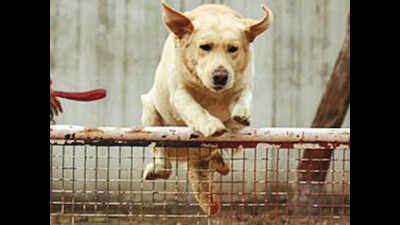- News
- City News
- bareilly News
- WWF body to train sniffer dog, two handlers for Pilibhit tiger reserve
Trending
This story is from September 11, 2019
WWF body to train sniffer dog, two handlers for Pilibhit tiger reserve
TRAFFIC India, the wildlife trade monitoring network under the aegis of World Wildlife Fund (WWF), has planned a nine month-long session to train a sniffer dog and its two handlers at Pilibhit tiger reserve (PTR), in order to curb trading in body parts of wild animals, and to detect wildlife criminals in forest regions.

The field director of PTR has been asked to finalise the list of forest department personnel to take part in the exercise latest by September 15
PILIBHIT: TRAFFIC India, the wildlife trade monitoring network under the aegis of World Wildlife Fund (WWF), has planned a nine month-long session to train a sniffer dog and its two handlers at Pilibhit tiger reserve (PTR), in order to curb trading in body parts of wild animals, and to detect wildlife criminals in forest regions.
The training will be given at Bhopal by experts of Madhya Pradesh Police.The field director of PTR has been asked to finalise the list of forest department personnel to take part in the exercise latest by September 15. Thus far, PTR lacked any such strategic measure.
As per Saket Badhola, the New Delhi-based country head of TRAFFIC, they have so far supplied trained sniffer dog squads to 66 tiger reserves, wildlife sanctuaries and other forest divisions across the country, all of which were deemed vulnerable to trade and trafficking in wildlife. These included Dudhwa reserve in Kheri district and Katarniaghat sanctuary in Bahraich district.
In addition, TRAFFIC has reviewed the status of many other sensitive forest regions which were in need of sniffer dogs, he said.
The PTR would be provided with one sniffer dog, which, along with its two handlers, would be trained in Bhopal. The training would comprise two phases —tracking and sniffing.
“Sniffing skills of dogs need to be different from region to region. The Himalayas are susceptible to smuggling of rare, indigenous herbs, while states like Assam, Nagaland and Manipur are afflicted with poaching of important wildlife species like rhinos, elephants, tigers, pangolins, etc. and trafficking of their body parts,” he said.
“That’s why sniffer dogs are trained to smell skins and bones of tigers and leopards, some scheduled aquatic animals, certain valuable herb species in addition to certain toxic substances which poachers use to poison wildlife,” Badhola said.
Referring to a report of the Wildlife Crime Control Bureau (WCCB), the India-programme director of the Turtle Survival Alliance (TSA), Dr Shailendra Singh, told TOI that, “Pilibhit-Kheri is one of the five most sensitive zones in Uttar Pradesh, identified for massive illegal trading in turtles, including the Indian soft-shell turtle, which has been enlisted in Schedule 1 of the Wildlife Protection Act.
PTR deputy director Naveen Khandelwal said Surendra Gautam, a forest guard at Mala forest range, and Jitendra Pal Singh, a forest beat watcher at Mahof forest range, have been selected to receive training as handlers of the sniffer dog.
The training will be given at Bhopal by experts of Madhya Pradesh Police.The field director of PTR has been asked to finalise the list of forest department personnel to take part in the exercise latest by September 15. Thus far, PTR lacked any such strategic measure.
As per Saket Badhola, the New Delhi-based country head of TRAFFIC, they have so far supplied trained sniffer dog squads to 66 tiger reserves, wildlife sanctuaries and other forest divisions across the country, all of which were deemed vulnerable to trade and trafficking in wildlife. These included Dudhwa reserve in Kheri district and Katarniaghat sanctuary in Bahraich district.
In addition, TRAFFIC has reviewed the status of many other sensitive forest regions which were in need of sniffer dogs, he said.
“We’re now planning to equip certain important airports, seaports and the railway protection force with sniffer dog squads, as airways, waterways and railways are the prime conduits of wildlife trafficking,” Badhola said while talking to TOI on the phone.
The PTR would be provided with one sniffer dog, which, along with its two handlers, would be trained in Bhopal. The training would comprise two phases —tracking and sniffing.
“Sniffing skills of dogs need to be different from region to region. The Himalayas are susceptible to smuggling of rare, indigenous herbs, while states like Assam, Nagaland and Manipur are afflicted with poaching of important wildlife species like rhinos, elephants, tigers, pangolins, etc. and trafficking of their body parts,” he said.
“That’s why sniffer dogs are trained to smell skins and bones of tigers and leopards, some scheduled aquatic animals, certain valuable herb species in addition to certain toxic substances which poachers use to poison wildlife,” Badhola said.
Referring to a report of the Wildlife Crime Control Bureau (WCCB), the India-programme director of the Turtle Survival Alliance (TSA), Dr Shailendra Singh, told TOI that, “Pilibhit-Kheri is one of the five most sensitive zones in Uttar Pradesh, identified for massive illegal trading in turtles, including the Indian soft-shell turtle, which has been enlisted in Schedule 1 of the Wildlife Protection Act.
PTR deputy director Naveen Khandelwal said Surendra Gautam, a forest guard at Mala forest range, and Jitendra Pal Singh, a forest beat watcher at Mahof forest range, have been selected to receive training as handlers of the sniffer dog.
End of Article
FOLLOW US ON SOCIAL MEDIA











